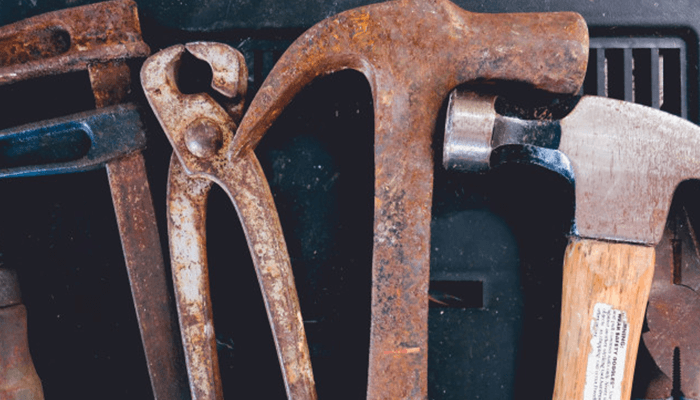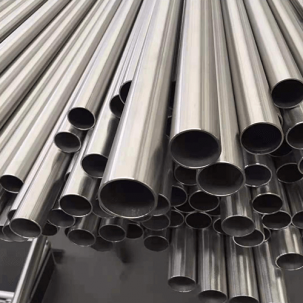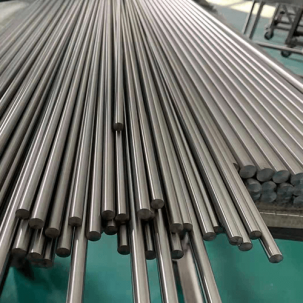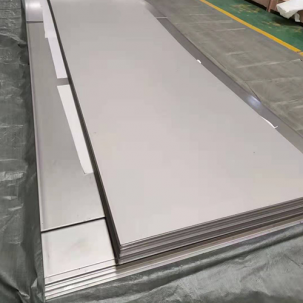If you’ve ever owned anything metal, you’ve likely experienced rust. This results in a reddish-brown substance on metal objects that’s undesirable. We’ve shared some tricks on how to remove rust to leave your metal surfaces smooth, clean, and most importantly, rust-free.
This occurs when metal experiences prolonged contact with water combined with oxygen, creating a process called oxidation.
We believe that prevention is better than cure, so we suggest trying to keep metal surfaces dry to avoid rust in the first place. When that’s not possible, opt for a rust-remedy product or choose to make a DIY rust removal option.
How to Remove Rust from Metal Using Homemade Rust Removers
Before we explore how to remove rust with natural remedies, let’s discuss some of the problems associated with rust.
Aside from looking unpleasant, rust reduces an item’s lifespan as it’ll require repairs or replacements if rust becomes too damaging. You’ll also need to spend a lot of time and money on making these repairs.
For more concerning matters, rust can endanger your safety (if you consider a metal bridge that’s become rusted). This is since rust can lead to brittleness, thus, eventually causing a product to snap inevitably.
To combat these scary consequences, here are some of our best-recommended homemade rust removers.
1. Vinegar for Rust Removal
Vinegar is acidic, making it a great household cleaner.
It’s also an effective solution for removing rust from metal because rust reacts with vinegar to later dissolve and leave the area clean. It’s also a budget-friendly answer while avoiding any harsh chemicals.
Here’s how to use white vinegar for rust removal.
- Soak a scouring pad in vinegar for 30 minutes to 24 hours, depending on the intensity of the rust.
- After this time period, scrub the rusted area, using forward and backward motions.
- If the scouring pad becomes soiled, rinse with water and re-soak in vinegar. Repeat the process until the rust has disappeared.
- Rinse the metal with clean water and dry thoroughly with a cloth.
2. Baking Soda for Cleaning Rust
Baking soda is a cost-effective, readily-available household product that you probably already have at home.
When mixed to form a paste, it creates a thick mixture that coats the entire area, helping to reduce surface corrosion.
Here’s how to remove rust using baking soda.
- Mix the baking soda with water to create a thick paste if you’re removing rust from stubborn surfaces.
- For stubborn rust, apply the paste to the area and leave for a couple of hours.
- Use a toothbrush to rub into the mixture. For heavily rusted areas, we recommend a toothbrush with hard, unused bristles.
- Scrub the rusted area and regularly rinse the bristles to remove any rust particles.
- If the rust hasn’t removed, rub the toothbrush into the mixture again and repeat.
- Rinse the area and pat dry.
3. Cleaning Rust With Lime or Lemon Juice and Salt
You likely already have lime or lemon juice and salt in the house, preventing an unnecessary trip to the stores.
The acidity of lime or lemon juice helps to loosen rust from the material underneath. Salt then works in tandem to act as a gentle abrasive, while not scratching or damaging metal.
Here’s how to remove rust from metal using lime or lemon juice and salt.
- Sprinkle plenty of salt over the rusted area until it’s completely covered. Squeeze lime or lemon juice over the area and allow to sit for 3-4 hours.
- After this time period, scrub the area in circular motions with a soft cloth, so the salt can exfoliate the surface for a smoother finish.
- Rinse the area with clean water and dry with a towel.
4. How to Clean Rust With a Potato and Dish Soap
Who’d have thought that a potato can remove rust?
Well, potatoes contain oxalic acid, which can break down rust and is a non-toxic method to cleaning baking pans, a kitchen sink, kettle, knives, and other household items.
Here’s how to remove rust using a potato and dish soap.
- Cut a potato in half lengthwise or crosswise, depending on the surface area you’re covering.
- Dip the cut end in dish soap and apply it to the rusted area.
- If the potato gets slimy, slice off the layer to reveal a newly cut end. Apply this to the dish soap.
- Repeat these steps until the rust is removed. Rinse the area and dry with a cloth.
5. Easy Rust Removal Using Coca-Cola
This delicious drink makes an effective rust-remover because it’s carbonated, allowing it to dissolve with metal oxides and break up any rust.
In addition, phosphoric acid helps to power through stubborn rust, while citric acid remains any stains.
If you intend to apply it to an electrical appliance, make sure you unplug it from the main socket to avoid any shocks.
Here’s how to remove rust using Coca-Cola.
- Submerge the metal item in a glass of Coca-Cola and leave overnight for the drink to dissolve the rust.
- If the metal object is too large to fit in a glass, pour the liquid directly onto the rust or soak it in a cloth and apply it to the rusted area.
- Once you’ve left the rusted appliance in Coca-Cola overnight, remove it and clean the surface with water and dish soap. It can be a tricky substance to remove, so you may need to repeat this process a few times.
6. Commercial Rust Remover
For the easiest solution, a store-bought rust removal product will remove rust on tools and other products without you having to search around your home for the required ingredients and mix them together.
These products will save you a lot of elbow grease.
How to Choose a Commercial Rust Remover
First, consider if you’re concentrated or non-concentrated formulas. Both types of products are reliable and effective, but if you’re looking for a budget-friendly option, we recommend the concentrated version.
Alternatively, non-concentrated rust removers tend to be more expensive. However, increased concentration can go a long way, meaning that the product actually ends up lasting you longer. A more concentrated commercial rust remover is one of the best options for working with a larger surface area and stubborn rust.
Organic vs Non-Organic Ingredients
Next, you’ll need to research more about the ingredients used in the commercial rust remover. Although there aren’t too many products that use an entirely organic list of ingredients, you may prefer to opt for a larger list of organic components.
Being sourced from fruits and vegetables makes organic rust removers more environmentally-friendly and non-toxic. They also contain fewer odors and fumes, helping to make them safer indoors.
Liquid or Powder Rust Removers
Finally, it’s time to choose between liquid or powder rust removers. The main difference between these two forms is the amount of strength and effort required. For example, a powdered chemical rust remover required more scrubbing. Alternatively, a liquid rust remover is quicker to apply to a larger surface and gets to work instantly with no scrubbing required. However, this requires more settling time so it can take longer to witness the results.
7. Use Abrasive Tools to Grind, Sand or Scour Off the Rust
Aside from the main materials and ingredients used for rust removal, the applicator or rust removal tools can make a big difference in the amount of effort required and results.
If you want to avoid using chemical products, a powerful rust remover tool, such as a grinder, drill, sander, or oscillating tool can remove rust from metals.
For example, a grinder with a stripping disc provides quick work for targeting a large surface area and heavy layers of rust. However, you’ll need to keep the tool moving or you’ll damage the metal.
Alternatively, for smaller areas or to remove a thin layer of rust, a traditional sander will do the job. This requires more manual labour. Use small, circular motions on the affected area to watch the rust fall off before your eyes.
8. Rust Converter
Rust converters are water-based primers that contain tannic acid and an organic polymer. These ingredients work together to react with rust and chemically convert it to a dark-colored material that you then wipe away.
This overall chemical reaction acts as a great method to remove rust while resulting in an excellent primer for paints.
The main difference between rust converters and rust removers is that a rust converter spray conceals the existence of any rust, as well as preventing further corrosion, thus saving the hassle of repeating the process in a couple of months. However, you’ll need to thoroughly prepare the rusted area before application to ensure the best results.
9. Use a Chemical Solution
You might be wondering whether you should purchase a chemical rust remover or create your own solution to use on tools, hardware, metal, aluminum, stainless steel, and rusted metal.
For a cheap solution, a chemical acid makes a great option, such as the following.
Oxalic Acid
This chemical solution is effective at eating rust that it can get into direct contact with. It’s also a reliable answer if you want to know how to get rid of rust quickly.
You can use it on a variety of materials, including metal, wood, fiberglass, and non-slip surfaces. Oxalic acid also removes stains, including rust, dirt, bird lime, rubber marks, and more.
Citric Acid
Alternatively, citric acid is an effective solution for removing rust from metal and is cheap to do so. All you need is citric acid and several gallons of water. Plus, it’s biodegradable, clean, and safe to use and can get into nooks and crannies.
Before applying citric acid to rusted metal, clean the area with WD-40 to remove any build up of dirt, grime, and grease. These substances can act as a barrier between the metal and citric acid, so it’s important to remove them.
FAQ
1. What Takes off Rust Fast?
If you want to remove rust from metal quickly, the best approach is to use baking soda. Compared to the other methods above, you don’t have to soak the metal for as long. In fact, a thick paste of baking soda usually does the trick so you can scrub the rusted area immediately.
2. How Long Do I Soak Metal in Vinegar to Remove Rust?
The answer to this is dependent on the extent of the rust on the item. Generally speaking, you’ll need to soak the metal in vinegar for 30 minutes to 24 hours. For metals that are too large to soak in a tub of vinegar, you can soak a scouring pad in vinegar instead and then apply directly to the rusted item.
3. Is Vinegar Corrosive to Metal?
Although vinegar is effective at removing rust, it can be harmful to aluminum. This is because it’s very acidic in nature. To avoid any corrosion, avoiding letting vinegar sit on aluminum for too long without rinsing. The best way to be sure is to leave for a few hours and then rinse. You can then repeat this process if major rust is still present.
4. What Chemicals Get Rid of Rust?
The most common chemical to remove rust is phosphoric acid. This forms a chemical reaction once it’s applied to rust that then turns it into a water-soluble compound that can be scrubbed away easily.
5. Can I Paint Over Rusted Metal?
No. The first step is to remove any rust and flaking paint caused by the rust. Then, apply a rust primer to create a smooth base before painting over the metal surface. But if the area is too uneven and has rusted flakes, scrub the metal areas first with a wire brush. Once done, you can paint over rust.
Final Thoughts
There’s a profusion of rust removers and treatments on the market, but these can be expensive and can use chemicals that are bad for the environment and unsafe to use around pets and children.
Fortunately, the above DIY rust removals are cheap, easy rust removals
to make, and best of all, work effectively. Plus, you’ve likely got these products at home, which saves you a trip to the stores.
Have you tried any of the above methods or do you have any homemade remedies you’d love to share with others?
Let us know your feedback in the comments.





